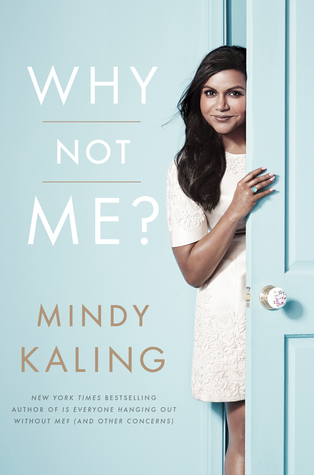 |
| goodreads |
A couple weeks ago I read Why Not Me? by Mindy Kaling and thoroughly enjoyed it. Not surprising since I'm a fan of her first book as well. The "All the Opinions You Will Ever Need" section was my favorite (it featured the great essay on confidence). Her reflections on said confidence, body image, 4 a.m. anxieties, and hard work are hilarious and completely spot on.
I think asking yourself "Why not me?" is a good way to get yourself over a perceived insecurity or obstacle. For whatever reason you may not have a lot of relatable role models around you - say you're a woman in a male-heavy industry, or you're a young'n in a firm filled with more seasoned professionals. There have been times in my career when I've realized I'd been suffering from impostor syndrome. Research indicates that the higher women move up the so-called corporate ladder, the louder those impostor voices become. partly since, "they can't be what they can't see" and partly because we get so many mixed signals about how to succeed. But you can flip the insecurity on its head just by asking, "Why not me?"
My first role models were my parents. Mom's training was in nursing and I remember her going off to work the night shift when I was very young. By the time I was in my teens, she was running a nursing home, dealing with customers, staff, vendors, and government regulators. Needless to say she is one of the hardest working women I know. Dad's career began as an engineer but after our family settled in the U.S. he supported us more at home. My parents could have remained in the Philippines and we probably would have had a good life there, but they threw themselves into a new country and raised kids here. Their hard work afforded us education and a pathway to establishing our livelihoods in our new homeland. They were the first of their siblings to land here and I imagine did not have many people to guide them along, but that didn't stop them from digging in and setting down roots.
When I started my career, I went a more corporate route than my parents, and have been lucky to have several role models around me (male and female, though I'll focus on the females right now). Knowing them has helped me navigate my organizations and industries while having a life outside of work. They've helped me get through stressful times whether it was business challenges or some personal suffering. I've relied on these real life mentors just as much as I appreciate reading about the Sheryls and Marissa's of the tech world. While high profile executives add visibility to issues for women in the workplace, NYmag's article about interactions with women at various levels and of various personalities reasonated with me. From "Why We Need Older Women in the Workplace":
The better plan would be for a young woman to enter a workplace and, upon looking around, see lots and lots and lots of established, successful females from which to collate a vision of herself: the loner, the sycophant, the ass-kicker, the honest broker, the backstabber, the flirt, the wheedler, the warm hug, the cold fish, the brainiac, the yeller, the whisperer, the diplomat, the hoop-jumper, the straight-A student, the zealot, the do-gooder. Role models don’t have to be superheroes, in other words, or even necessarily exemplary; there just have enough of them, and they have to have made it work. - NYmag
(Side note, the NYMag series "She's the Boss" was great to read through this summer.)
Earlier this year I listened to a talk by Dr. Caroline Heldman, who presented that women are more likely to suffer from impostor syndrome than men, and women of color (that's me!) are more likely to suffer more it than white women. By having more role models, in quantity and variety, around us, women will suffer less from impostor syndrome. And the more anyone believes she can shape and pursue her own goals, the more it will actually happen.
One of my favorite parts in Kaling's book is when she discusses what she can and can't do now that she's famous. It starts off with some superficial things but then she gets into the potential of changing people's lives. She says now she hears from young women who felt marginalized but got some validation from seeing her be successful, and she realizes what a pioneer she is.
"I want to be a better person because I don't want to disappoint those girls... And all that stuff I do to "appear" better has actually made me a better person."Despite discussing being a role model due to her status, Kaling still comes off as being down-to-earth. She knows she's not #flawless (I love how she is unapologetic she is about her cooking skills) and doesn't try to present herself that way. She clearly understands the point of being a role model.
Some additional role-model-related links:
- Designers meeting their role model: http://www.refinery29.com/apiece-apart-eileen-fisher
- A daily newsletter on all the ass-kicking women in the business world: http://fortune.com/newsletter/broadsheet/
- 20 years later, I still get excited about Tragic Kingdom (I finally saw No Doubt play this year in Napa!): http://nymag.com/thecut/2015/10/gwen-stefani-was-the-perfect-preteen-idol.html
